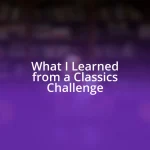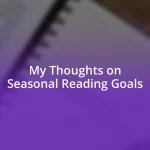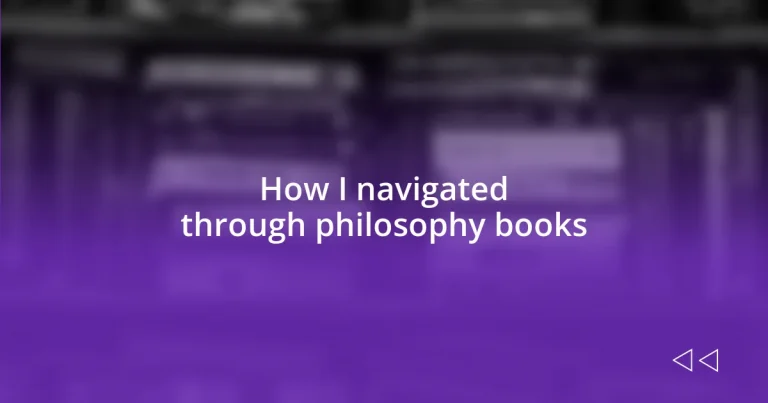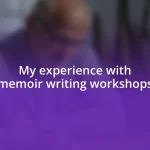Key takeaways:
- Identifying personal interests and seeking diverse recommendations can greatly enhance the selection of philosophy books, leading to a more engaging reading experience.
- Developing a reading strategy—such as setting goals, taking notes, and discussing ideas—can transform passive reading into an active and meaningful dialogue with philosophical concepts.
- Applying philosophical insights to everyday life, such as embracing Stoicism and utilitarian principles, can lead to personal growth and improved decision-making in relationships and challenges.
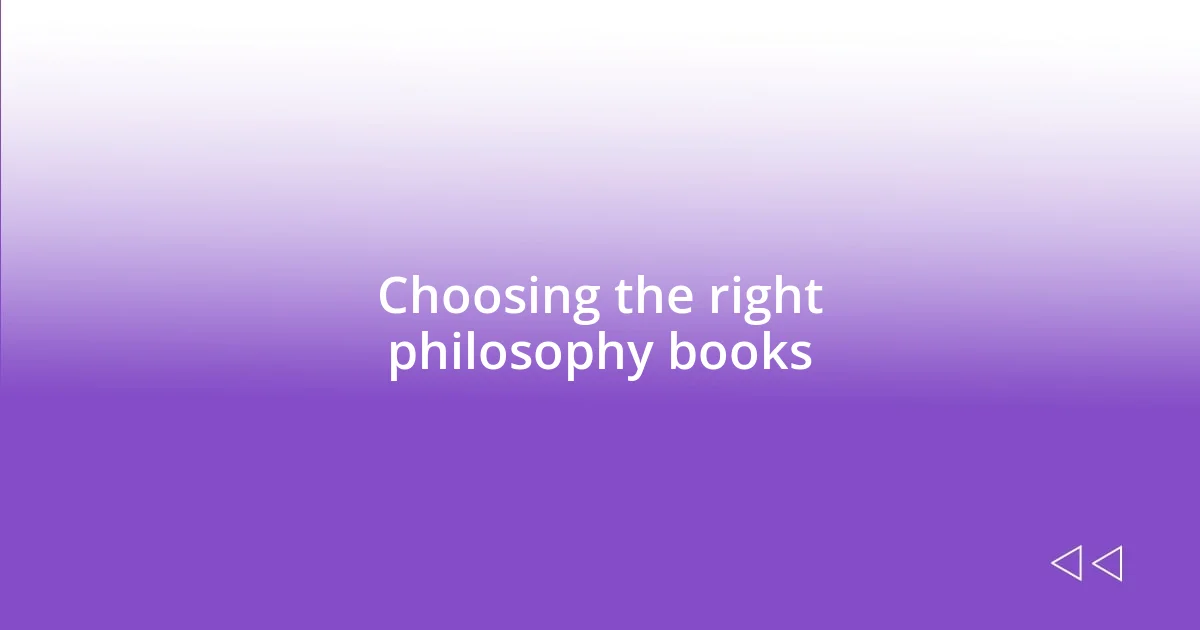
Choosing the right philosophy books
When I first dove into the realm of philosophy, I felt overwhelmed by the sheer volume of titles available. I remember standing in a bookstore, trying to decide between reading Plato’s “The Republic” or getting into Nietzsche’s “Thus Spoke Zarathustra.” How do you choose the right philosophy book when each one promises profound insight?
One strategy that worked wonders for me was identifying what sparks my curiosity. I once found myself fascinated by moral dilemmas, so I turned to Judith Jarvis Thomson’s essays on ethics. This approach not only deepened my understanding but also made the journey personally fulfilling. Isn’t it easier to engage with a text that aligns with your interests?
I also learned to seek recommendations from diverse sources, whether it’s online forums or trusted friends. After reading a friend’s enthusiastic review of Simone de Beauvoir’s “The Second Sex,” I decided to explore feminist philosophy. That book not only expanded my perspectives but also ignited a passion for topics I hadn’t considered before. What hidden gems might you discover by tapping into your network?
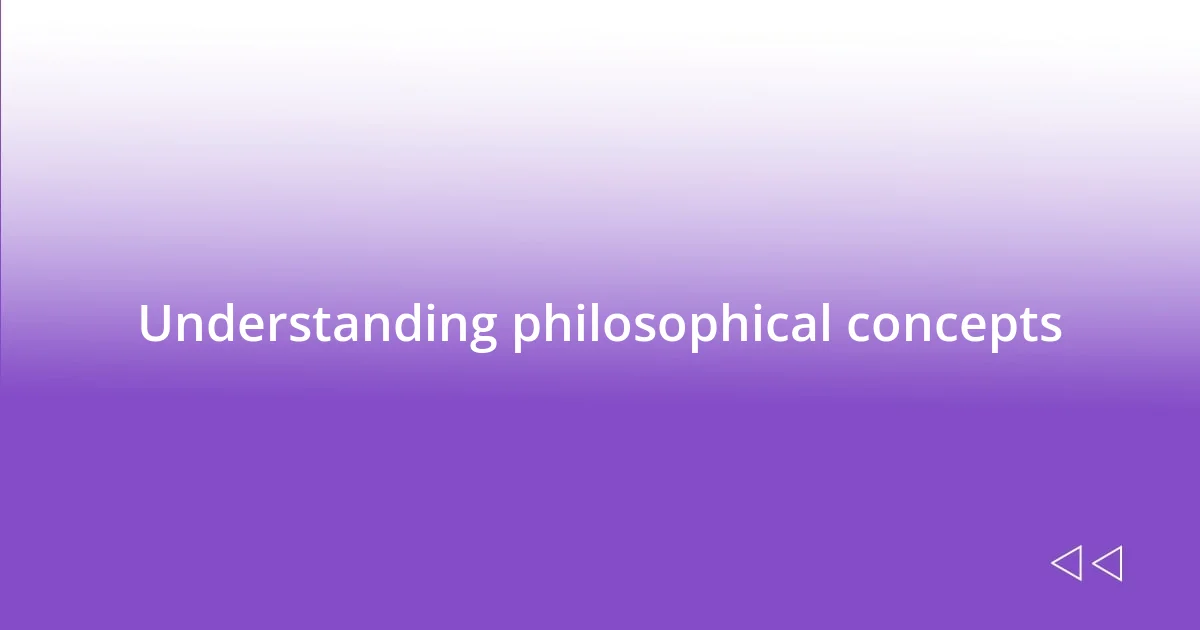
Understanding philosophical concepts
Understanding philosophical concepts can feel like traversing a labyrinth of thoughts and theories. One specific instance I remember was the moment I encountered Descartes’ method of doubt. It struck me how radically he questioned everything he previously accepted as true. This experience made me realize the power of skepticism in philosophy; it’s about dismantling beliefs to build a stronger, more validated understanding of reality.
There’s also something intriguing about how different philosophers approach similar issues. For instance, studying both Kant and Mill helped me appreciate the contrast between deontology and utilitarianism. This comparison allowed me to reflect on my values and how they align with moral theories. I found myself frequently jotting down my thoughts as I grappling with their ideas—an exercise that brought clarity to my own ethical stance.
When I began exploring Eastern philosophies, particularly with the works of Confucius and Lao Tzu, I encountered concepts that challenged my Western thinking. The emphasis on harmony and balance struck a chord with me. I began to see how these philosophies could provide practical wisdom for everyday life, enhancing my personal growth and perspective on interpersonal relationships. Isn’t it astonishing how these sometimes vastly different traditions can deepen our understanding of the human experience?
| Philosopher | Major Concept |
|---|---|
| Descartes | Method of doubt |
| Kant | Deontology |
| Mill | Utilitarianism |
| Confucius | Harmony |
| Lao Tzu | Balance |
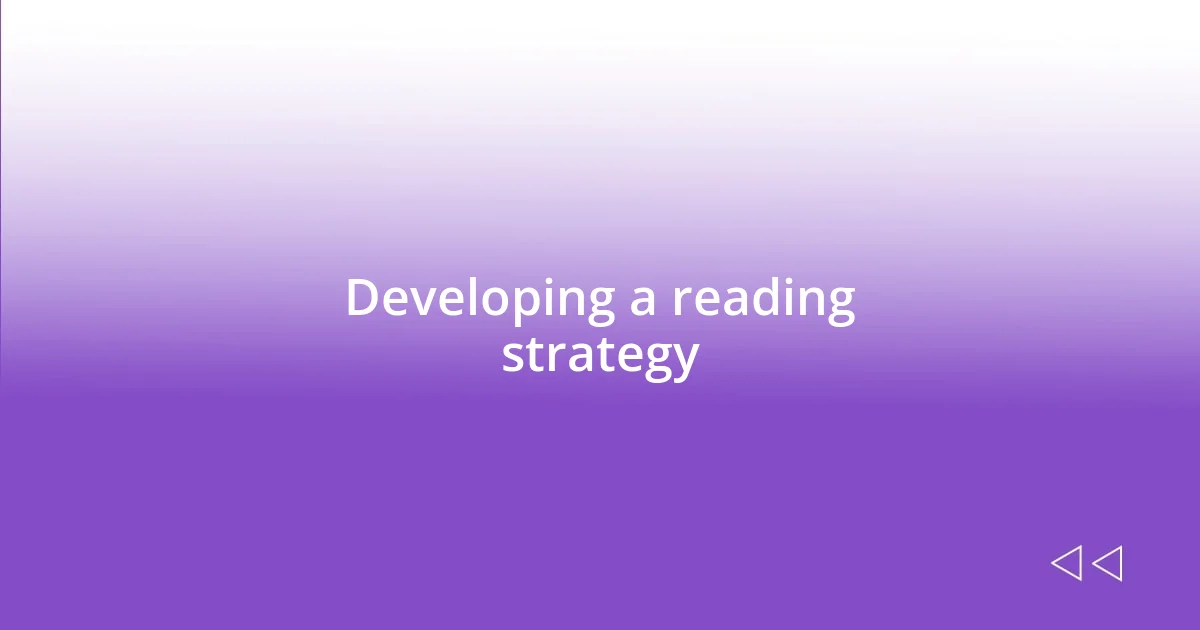
Developing a reading strategy
Developing an effective reading strategy for philosophy can dramatically enhance your comprehension and enjoyment of these complex texts. I learned that approaching the material with a clear purpose significantly improved my focus. For example, when I started reading Sartre’s “Being and Nothingness,” I set the intention to grasp his existential ideas about freedom and responsibility, which helped me navigate the dense prose. I often marked passages that resonated emotionally, revisiting them to deepen my understanding.
To create your own reading strategy, consider the following tips:
- Set specific goals: Know what you want to achieve with each text—be it an understanding of a particular concept or a reflection on personal beliefs.
- Break it down: Tackle the book in manageable sections, allowing time to reflect on each piece before moving on.
- Take notes: Jot down your thoughts, questions, and insights as you read; this makes the process interactive and memorable.
- Engage in discussions: Share your thoughts with others or find a study group. Explaining concepts helps reinforce what you’ve learned.
- Reflect on your emotions: Pay attention to how the ideas affect you personally; this connection can elevate your engagement level.
With this approach, I found myself not just reading but truly interacting with the material. It transformed my experience from passive ingestion to an active dialogue with some of the greatest thinkers. How about you? What strategies spark your interest in engaging with philosophy?
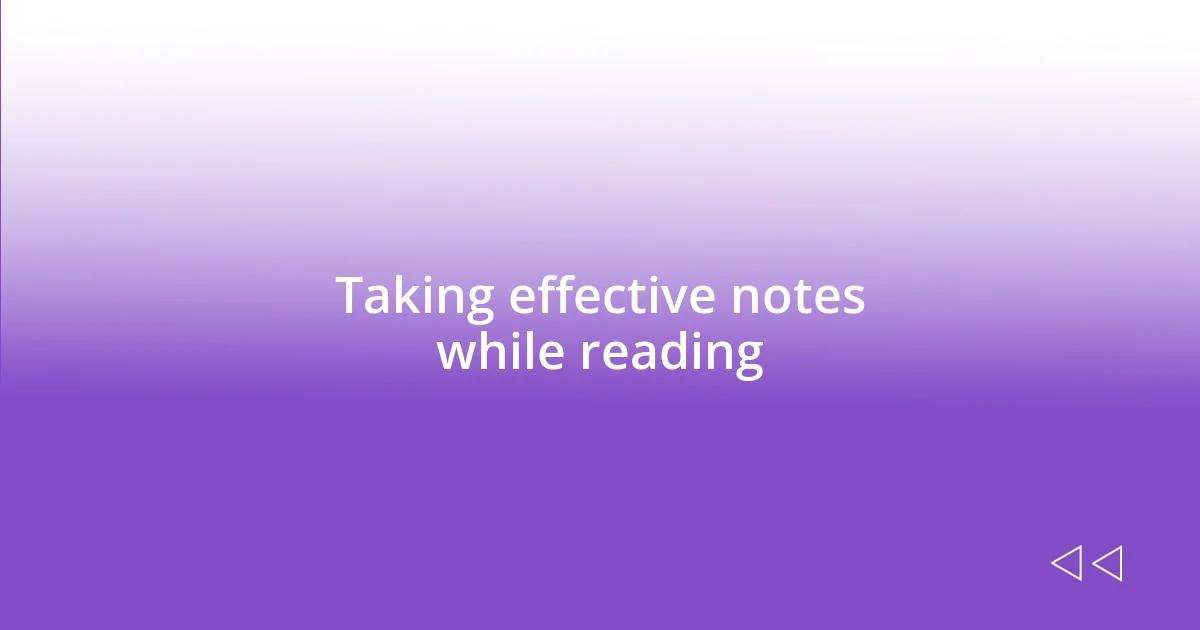
Taking effective notes while reading
Taking effective notes while reading philosophy can be a transformative experience. When I first started, I found that simply summarizing concepts wasn’t enough. I began to create mind maps, connecting ideas visually, which allowed me to see relationships among different philosophers. For instance, one map I crafted linked Descartes’ skepticism to Kant’s deontological ethics, highlighting how these foundations challenged and built upon each other in my understanding. It felt like piecing together a complex puzzle where each fragment brought greater clarity.
Another method that helped me was the use of personal reflection notes. While reading Heidegger, I’d pause frequently to jot down how his thoughts resonated with my own experiences. This practice wasn’t just about comprehension; it added a layer of emotional engagement. I recall one late night, grappling with the idea of “Being,” and a lightbulb moment struck me! I wrote, “My existence has weight and significance!” This connection made the concepts not just abstract theories but vibrant reflections of my own life.
I’ve also found that asking questions as I read significantly enhances my engagement. Why did this philosopher hold that view? How does it relate to current issues? For example, while poring over Nietzsche’s works, I questioned how his ideas about the “will to power” reflected in my daily motivations. Answering those questions deepened my understanding, transforming my reading into a rich exploration rather than a mere academic task. How do you approach note-taking during your philosophical readings?
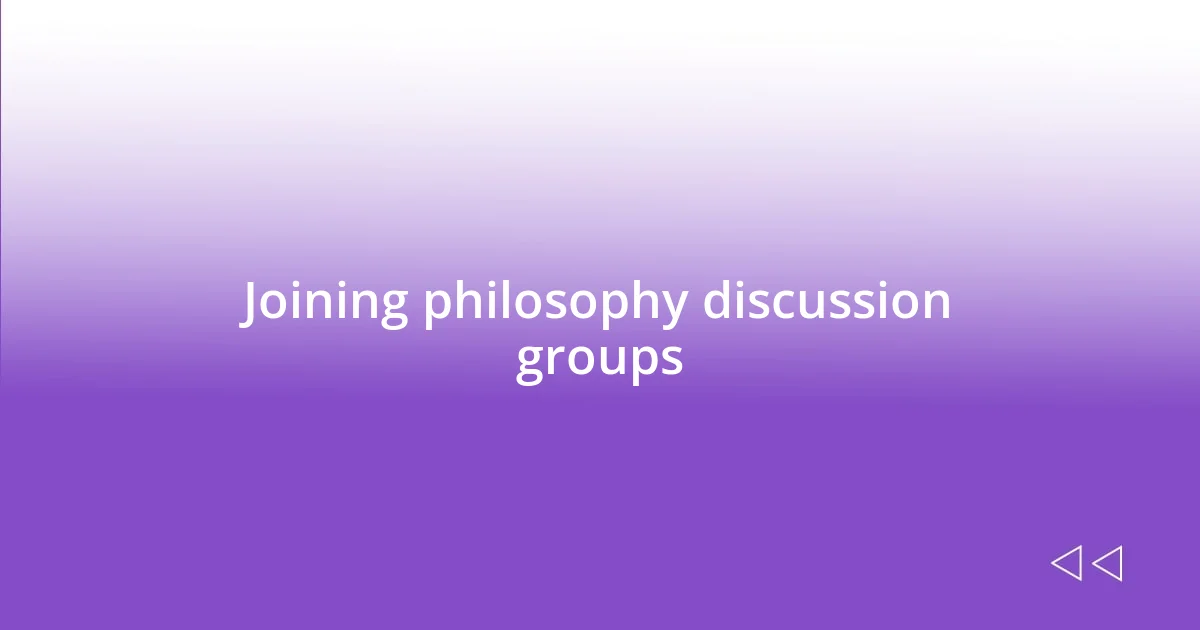
Joining philosophy discussion groups
Joining a philosophy discussion group can be an enlightening experience, one that I wholeheartedly recommend. When I first joined a local meetup, I felt nervous yet excited; I wondered if I’d be able to keep up with the discussions. However, those initial jitters faded quickly as I found myself immersed in passionate dialogues about ethics, metaphysics, and everything in between. It was during these sessions that I realized how diverse perspectives could challenge and refine my own thoughts in ways I hadn’t anticipated.
What I appreciate most about these groups is the atmosphere of respectful disagreement that often prevails. I recall one lively debate over the implications of utilitarianism. Members shared different interpretations and personal anecdotes, creating a rich tapestry of insights that deepened my understanding. I began to see not just philosophical principles but also their real-world applications, sparking my curiosity with questions like, “How would I respond in that ethical dilemma?” These discussions encouraged me to think beyond my own worldview, inviting me to explore the nuances of concepts I thought I understood.
Getting involved in these groups doesn’t only enhance your knowledge; it cultivates a sense of community among fellow enthusiasts. I’ve formed lasting friendships with people who share the same thirst for understanding life’s big questions. There’s something invigorating about knowing you’re not alone in your philosophical journey—after all, who hasn’t felt overwhelmed by Schrödinger’s cat or the complexities of free will? Being part of a discussion group makes those ponderings feel a bit less daunting and much more enriching. How has your exploration in philosophy shaped your connections with others?
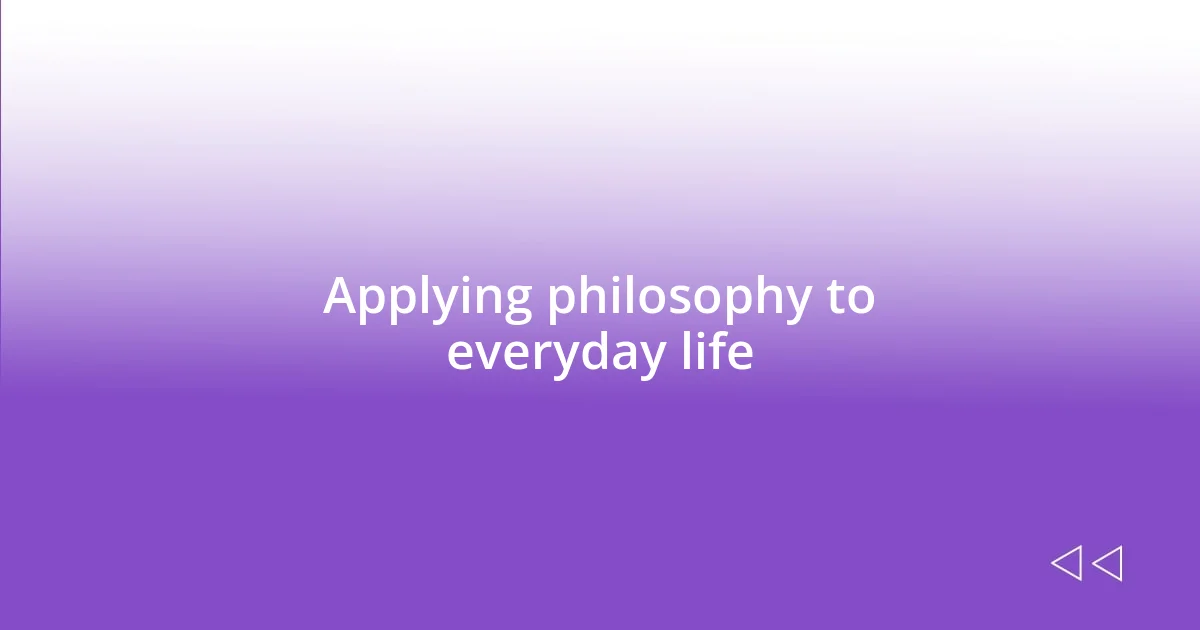
Applying philosophy to everyday life
Integrating philosophy into my daily life has reshaped my perspective in profound ways. For instance, I started practicing Stoicism during tough times, focusing on controlling only what I can. The moment I faced a setback at work, instead of spiraling into frustration, I reminded myself of Epictetus’ teachings: “It’s not what happens to you, but how you react to it.” This shift in mindset allowed me to approach challenges with calm, turning obstacles into opportunities for growth.
I also find that philosophical concepts help me navigate relationships more effectively. When I learned about existentialism, it deepened my appreciation for personal choice and authenticity. I recall a particularly tense conversation with a friend where we disagreed on a significant issue. Instead of digging my heels in, I embraced the idea that our differing viewpoints added value to the dialogue. Asking questions like, “What led you to this belief?” opened the door to understanding and reinforced the idea that our perspectives are shaped by unique life experiences. How often do we let our assumptions cloud meaningful conversations?
Philosophy has a unique way of illuminating everyday decisions. For example, embracing utilitarian principles has made me more mindful of the consequences of my actions. When deciding how to spend my time—whether volunteering or simply enjoying leisure—I pondered which choice would create the most happiness for the greatest number. This reflection not only enriched my life but also inspired me to engage in community service, leading to unexpected friendships and fulfillment. Isn’t it fascinating how considering philosophical ideas can lead to tangible improvements in our lives?
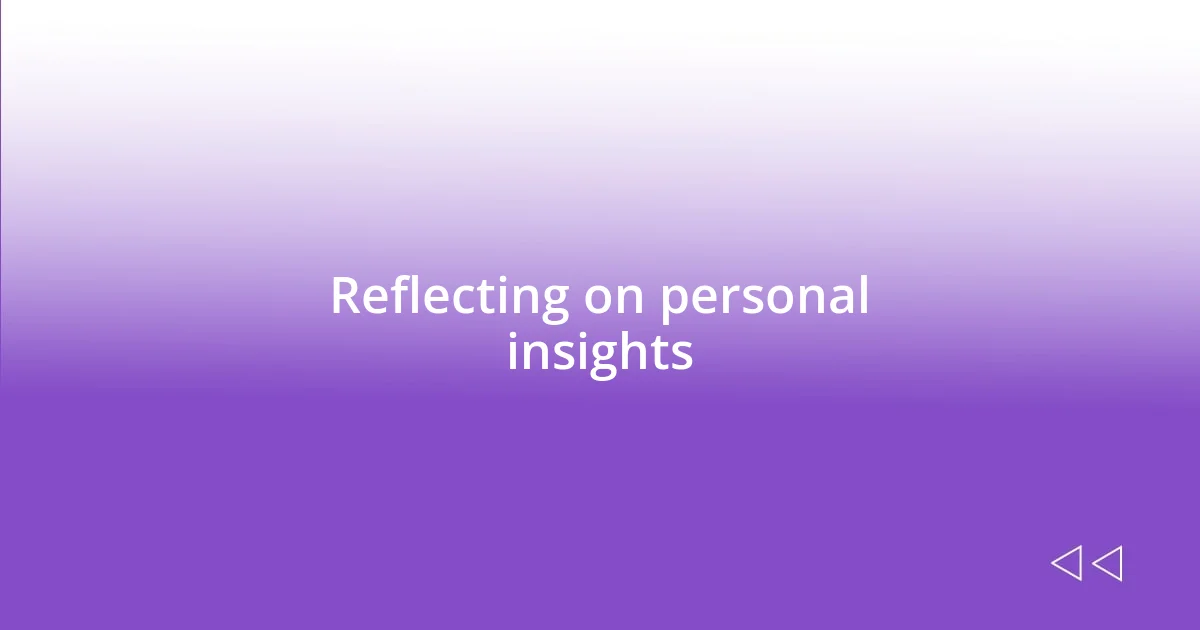
Reflecting on personal insights
Reflecting on my journey through philosophy books has been an eye-opening experience. There were moments when I stumbled upon ideas that resonated deeply—like when I read about Nietzsche’s concept of the “Übermensch.” This notion sparked a personal crisis, pushing me to ask, “What does it truly mean to strive for greatness?” It was a wake-up call, nudging me to rethink my aspirations and values, transforming vague ambitions into a clearer vision of personal excellence.
I remember one evening after reading Camus’ “The Myth of Sisyphus.” As the sun set, I found myself pondering the idea of finding meaning in absurdity. This was more than just an intellectual exercise; it struck a chord with my own feelings of frustration during challenging times. I thought about how often we confront our own Sisyphean boulders. What if, instead of feeling defeated, we embraced our struggles as part of a larger narrative? This realization provided solace and shifted my perspective towards resilience.
Sometimes, I find that my insights clash with what I previously believed. While reading Plato’s “Allegory of the Cave,” I couldn’t help but reflect on my past ignorance. I felt a mixture of embarrassment and empowerment upon recognizing how my own biases had clouded my understanding. It made me wonder: how many views do I still hold unchallenged? This ongoing reflection encourages me to remain curious, committed to shedding my shadows for the light of knowledge—an endeavor that is as liberating as it is daunting.


